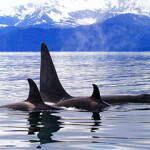EDF building bridges between US, Japanese fisheries managers

A virtual climate and fisheries workshop hosted in July by the Environmental Defense Fund had the goal of building bridges between fisheries managers in Japan and the United States.
The seminar organized by the New York City, U.S.A.-based NGO brought together scientists from the National Marine Fisheries Service and Japan’s Fisheries Research and Education Agency to discuss current and future climate-related changes in fisheries, data gaps impeding optimal management practices, and opportunities for collaboration.
There were several presentations from Japanese scientists, NOAA scientists, and EDF scientists, touching on specific challenges driven by climate change, including poor recruitment due to warming water, as well as socioeconomic issues such as how to address quota allocations as stocks shift. They also discussed the creation of better early-warning systems and predictive tools, and explored some of the root causes of those challenges, such as shifting currents and marine heat waves.
EDF Pacific Region Deputy Director Shems Jud praised participants for embracing the value of international collaboration.
“It’s our hope that this workshop will be the first of several and that it will lead to increased collaboration on science for climate resilience between Japan and the U.S.,” he said.
Judd was previously involved in changes to management and data collection systems in the U.S. West Coast groundfish fishery and took part in a Tokyo workshop on electronic monitoring and fisheries data modernization in Tokyo in March 2019. EDF has an office in Singapore and also has a small team in Tokyo, until recently led by Kazu Otsuka. Judd is currently also covering that role.
EDF worked behind the scenes to nudge Japan toward its 2018 Fisheries Reform Act by providing expert advice and policy support to government officials, scientists, and regulators. The law will move Japan from a total allowable effort (TAE) system – in which the number, size, and period of operation of fishing boats, and the types of gear allowed, are regulated – to a total allowable catch (TAC) system with vessel quotas for most species, by 2024.
The shift to TAC will require a great many more stock assessments than Japan has previously performed. Before the fishery law reform, the TAC system covered eight fish species accounting for 60 percent of Japan’s domestic catch. In the future, TAC will be set according to resource-management targets, based on levels that achieve maximum sustainable yield. The goal is that 80 percent of Japan’s total catch will be under TAC management by 2023. This will require a substantial increase in stock assessments, and the gathering of a great deal of data to support the assessments, Jud said. It is also difficult to allocate quota to different prefectures, fishery cooperatives, and vessels when the distribution of the stocks is shifting due to changing current patterns and climate shifts. The seminars may help Japan by sharing the experiences of the U.S., according to EDF.
Also at the workshop, FAO Fisheries and Aquaculture Division Director Manuel Barange delivered a keynote address in which he challenged the idea barrier to action is just a lack of knowledge and understanding.
“This is not true in my experience working with countries here in FAO. The problem is decisions that affect people and affect jobs, the economy, food, politics are complex,” he said. “They involve trade-offs – and that may be different in different places and different situations.”
On climate change, he urged an approach that includes not just mitigating measures but also on finding new economic opportunities, such as commercializing new species as distribution patterns change.
“I don’t know why particularly, but when it comes to ocean issues, so many intelligent people conclude that protection is the solution to everything. [But] protection is a lazy fallback position to take,” he said.
Another EDF-organized workshop planned for September will focus on how to use technology, including artificial intelligence, to enhance data collection and to conduct quicker and more-accurate stock assessments to meet the mandates of Japan’s fishery law.
Photo courtesy of Environmental Defense Fund






Share